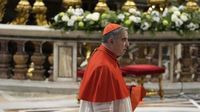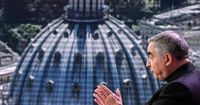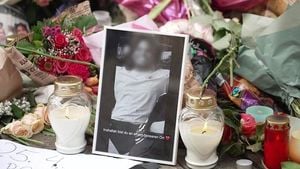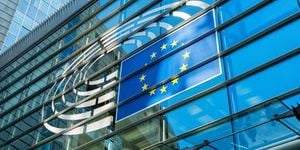As the Catholic Church mourns the passing of Pope Francis, the upcoming conclave to elect his successor is overshadowed by the controversial case of Cardinal Angelo Becciu. The cardinal, who was stripped of his Vatican roles and certain cardinal rights by Pope Francis in 2020, now asserts his intention to participate in the conclave, raising questions about the implications of his potential involvement.
Pope Francis died on April 23, 2025, and his funeral is scheduled for Saturday, April 26. The conclave, a sacred assembly of cardinals tasked with electing the new pope, is set to begin shortly after the funeral. Becciu's situation has become a focal point of discussion among the cardinals, particularly as the second general congregation of cardinals met on April 23 with 103 members present.
Becciu, who was removed from his position as prefect of the Congregation for the Causes of Saints on September 24, 2020, claimed that he never received any formal document excluding him from the conclave. "The Pope has never explicitly excluded me from the conclave. There has never been a request for my written renunciation, nor is there any document depriving me of my rights," he stated in an interview with Unione Sarda.
This claim is significant because, according to canon law, all cardinals under 80 years old have the right and duty to participate in the conclave. The Universi Dominici Gregis, which governs the election of the pope, states in Article 33 that the right to elect the Roman Pontiff belongs exclusively to the cardinals of the Holy Roman Church, while Article 35 specifies that no cardinal elector can be excluded from the election for any reason.
Becciu's cardinal status remains intact, and he continues to wear the cardinal's purple, despite his removal from official duties. His ongoing presence in the church's ceremonies and convocations suggests that he still holds some influence. However, his involvement in a high-profile financial scandal involving the purchase of a luxury property in London for 200 million euros has marred his reputation. The scandal has led to his conviction in the first instance for financial crimes, resulting in a sentence of five years and six months in prison, with an appeal expected in the fall of 2025.
With Becciu's participation, the number of voters in the conclave would increase from 135 to 136, which could potentially shift the dynamics within the Sacred College. Many within the Roman Curia are reportedly eager to ratify his entry into the conclave, but others remain cautious about the implications of his presence.
As discussions among the cardinals continue, the ambiguity surrounding Becciu's status poses a risk to the legitimacy of the conclave. If he were to participate and later be found to have been unjustly excluded, it could invalidate the election of the new pope. Conversely, if he were to be excluded without formal documentation, it would raise questions about the integrity of the process.
The situation reflects a broader crisis of clarity and authority within the church, as the lack of a formal decree regarding Becciu's exclusion has left many uncertainties. The Vatican press office had previously listed Becciu among the non-electors following Pope Francis' death, despite him being well below the age limit of 80.
Cardinal Becciu's case has sparked a debate about the balance between justice and mercy within the church. It highlights the need for clear, documented decisions to avoid ambiguity that could undermine the trust of the faithful. The absence of a formal act solidifying his exclusion has created a precarious situation that could lead to significant repercussions for the conclave.
Historically, there have been instances where the collegiality of the cardinals has resolved conflicts without harming the unity of the church. For example, in 1559, Cardinal Giovanni Morone, who had been imprisoned on charges of heresy, was admitted to the conclave and subsequently contributed to the election of Pope Pius IV. This precedent illustrates how the collective decision-making of the cardinals can navigate complex issues.
As the conclave approaches, the cardinal's future remains uncertain, and the stakes are high. The outcome could reshape the leadership of the Catholic Church in profound ways. Cardinal Pietro Parolin, the Secretary of State, has been suggested to address the ambiguity surrounding Becciu's position, but he has opted to leave the matter unresolved for now. "Let us leave everything as it is. The Pope knows what to do," he remarked.
As the cardinals prepare to gather in the Sistine Chapel, the question looms: will Cardinal Becciu be allowed to vote for the new pope, and what impact will his presence have on the election process? The answer could define the future of the papacy and the direction of the Catholic Church in the years to come.
The outcome of this conclave is anticipated to be pivotal, with various candidates emerging as potential successors to Pope Francis. Among the frontrunners is Cardinal Pietro Parolin, known for his ability to mediate between different factions within the church. However, the presence of Becciu could complicate the dynamics, especially among those who oppose the current papal direction.
As the church navigates this turbulent period, the implications of Cardinal Becciu's case will undoubtedly resonate beyond the conclave, shaping discussions about governance, accountability, and the church's role in the modern world.






